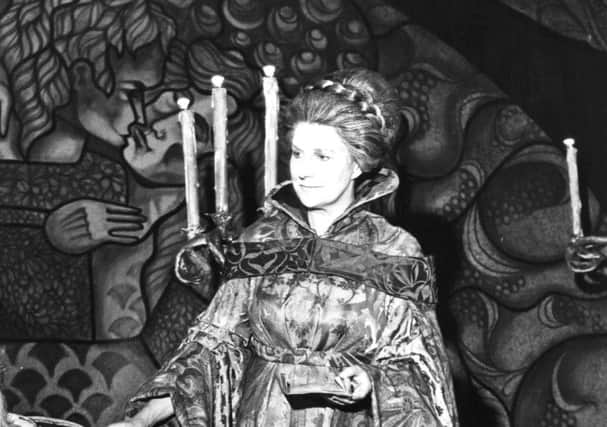Obituary: Anna Reynolds, mezzo-soprano


Anna Reynolds was a mezzo with a glowing and radiant voice, which conductor Sir Alexander Gibson noticed early in her career. She came to sing important roles – most memorably Wagnerian – with Scottish Opera (SO) often in the Sixties and became particularly associated with the challenging role of Fricka in Peter Ebert’s outstanding production of The Ring Cycle. The production was one of the great achievements of the Gibson era and his conducting of the huge score did much to establish SO internationally.
Later in Reynolds’ career she was to sing Fricka at Bayreuth opposite Birgit Nilsson’s commanding Brunhilde. The list of famous conductors with whom Reynolds worked included Herbert von Karajan, Carlo Maria Giulini and Leonard Bernstein.
Advertisement
Hide AdAdvertisement
Hide AdReynolds was one of the stalwarts who helped to give SO a very definite identity in its early years. Gibson had the instinctive knack of selecting talented emerging singers and Reynolds was one of his most important discoveries.
He first selected her to sing the mezzo part in a performance of The Messiah on New Year’s Day, 1965 and she made her debut with SO the following year as the greengrocer Mrs Herring in Benjamin Britten’s comic opera Albert Herring.
Reynolds was to return for many revivals of the production – one of the most popular in SO’s history – for four years.
It was in 1966 that Reynolds made her mark as a Valkyrie in Die Valkyrie and Gibson immediately promoted her the following year to sing the demanding role of Fricka and then Waltraute in 1968.
Again, such was Reynolds’ mastery of these long and vocally demanding roles that she returned to grace the productions in 1972. On completion of all four operas in 1971, Gibson understandably commented: “The Ring Cycle is Scottish Opera’s finest 19 hours.” Also that year she was Genevieve in the majestic production of Pelléas et Mélisande and returned to SO to sing Dorabella – the role previously sung majestically by Janet Baker – in the famous Besch production of Cosi fan tutte in 1972.
Her visits to Scotland in fact started at the beginning of her career at the 1964 Edinburgh Festival. Reynolds sang in a concert performance of Berlioz’s Romeo et Juliette conducted by Lorin Maazel. In 1971 she joined SO with a blistering account of Die Walkure and in 1976 she sang Beethoven’s Missa Solemnis under Giulini in a historic concert in the Usher Hall.
Anna Reynolds originally went to London’s Royal Academy of Music to study piano. While there her vocal talents were recognised and she switched to studying singing. After further study in Rome, she made her operatic debut in Parma in 1960 as Suzuki in Madama Butterfly.
Her career was established outside Scotland firstly at Glyndebourne, where she made her British debut in 1962 as Genevieve in Pelléas et Mélisande and in Der Rosenkavalier three years later.
Advertisement
Hide AdAdvertisement
Hide AdThis led to her being cast as a Valkyrie at Covent Garden in 1966, conducted by Georg Solti, and again with Solti in the famous revival the following year of Arabella with Dietrich Fischer-Dieskau and Reynolds as Adelaide. Reynolds sang Andromache in the world premiere of Tippett’s King Priam in 1975 with the Royal Opera.
By then she had married the distinguished tenor Jess Thomas and the two spent much of their time in Germany, where her career prospered. She first sang Fricka in Bayreuth in 1970 and the same year she was asked by Herbert von Karajan to sing the role at the Salzburg Festival. She also sang regularly at the Metropolitan Opera House in New York and Chicago.
Reynolds recorded extensively. She was widely recognised for her participation in Leonard Bernstein’s ground-breaking recording of Mahler’s Eighth Symphony (The Symphony of a Thousand) and sang on his acclaimed disc of Das Lied von der Erde. She became an authority on the Bach Cantatas – she said he was her favourite composer – and committed many to disc under Karl Richter.
Reynolds sang at a dramatic Prom (and subsequent recording) of the debut of John Tavener’s The Whale in 1969. The recording gained a certain notoriety as the composer played pipe and Hammond organs at the Albert Hall and on the recording.
Reynolds and her husband made a historic recording of Das Lied von der Erde with the Vienna Sympnony Orchestra in 1972 under the great Viennese conductor Josef Krips. One critic commented on Reynolds’ “bright, luscious voice and her captivating use of the words”.
After she retired, Reynolds taught extensively and, along with her husband, gave master classes at several musical academies. Her husband died in 2012.
Alasdair Steven